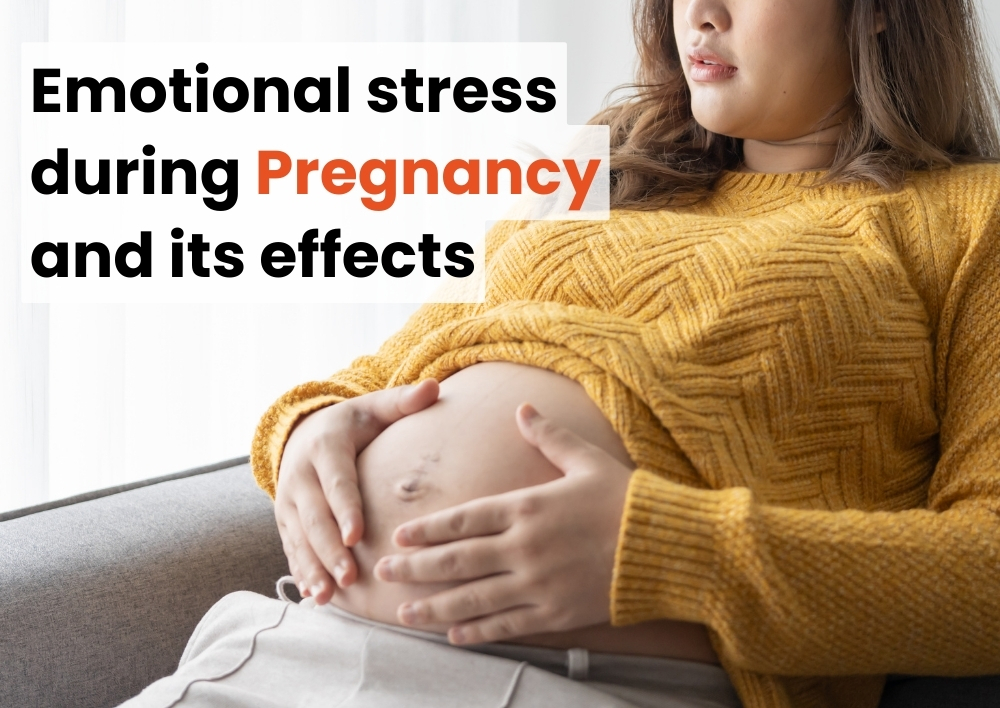Emotional Stress During Pregnancy and its Effects
Pregnancy is often seen as a beautiful and life-changing time, but it can also bring a lot of different emotions. It’s normal to feel a mix of joy, excitement, and even some stress, but some women experience emotional stress during pregnancy. For them, this beautiful time can feel overloaded. While your body is going through numerous changes, your mental and emotional health is also affected along with your physical health. In this blog post, the best gynaecologist in Gurgaon at Miracles Apollo Cradle shares insights on the effect of emotional stress on pregnancy, its causes, and simple tips to manage it, so you can enjoy this special time.
What is Emotional Stress During Pregnancy?
Emotional stress during pregnancy refers to the feelings of tension, anxiety, and overwhelm that result from various situations. During pregnancy, a woman may experience emotional stress due to many reasons, including hormonal changes, the physical strain of pregnancy, and the responsibility of bringing a new life into the world.
Emotional stress and pregnancy go hand in hand. Because emotional stress during pregnancy is common, but for some women, it becomes concerning when it is intense. The stress during pregnancy can lead to both physical and emotional complications for the mother and her developing baby.
How Emotional Stress Affects the Mother
Excessive emotional stress in pregnancy can have a range of effects on the mother. Stress doesn't only affect her physical but mental well-being too. Here is how emotional stress can manifest in a pregnant woman:
-
Physical Symptoms: Emotional stress usually presents itself via physical symptoms. These symptoms can include headaches, digestive issues, fatigue, and difficulty sleeping. Emotionally stressed pregnant women may also experience tightness in their chest, fast heartbeats, or shortness of breath.
-
Depression and Anxiety: Pregnancy is already a weak time for a woman’s mental health. Prolonged emotional stress during this time can lead to various mental health issues like depression and anxiety. The high levels of stress can exacerbate these issues. A pregnant woman may feel sad, hopeless, or anxious without a clear reason, which can interfere with her ability to care for herself and enjoy her pregnancy.
-
Difficulty Bonding with the Baby: Pregnancy is a time when many women start to bond with their baby. However, extreme emotional stress can interrupt this bonding process. A stressed mother may find it difficult to connect emotionally with her baby, and this disconnection can continue even after the baby is born.
-
High Blood Pressure: Stress causes the body to release the hormone cortisol, which raises blood pressure. During pregnancy, high blood pressure can lead to several complications such as preeclampsia.
-
Poor Self-Care: When a pregnant woman is emotionally stressed, she may neglect her self-care routine. This may include skipping meals, not exercising, or avoiding prenatal care appointments. In some cases, women may turn to unhealthy coping mechanisms such as overeating or using substances like alcohol or tobacco, which can be harmful to developing babies.
How Emotional Stress Affects the Baby
A mother’s emotional state during pregnancy can have lasting effects on her baby’s development. Research shows that high levels of emotional stress can impact the baby’s physical and cognitive health. Here are some ways emotional stress while pregnant can affect the baby:
-
Premature Birth: One of the most concerning effects of emotional stress during pregnancy is premature birth. Chronic stress can start early labor, leading to a baby being born before 37 weeks of gestation. Premature babies usually experience challenges such as underdeveloped organs, difficulty breathing, and a higher risk of infection.
-
Low Birth Weight: Babies born to mothers with high levels of stress during pregnancy may have a lower birth weight. Low birth weight is associated with an increased risk of health problems in the baby’s early life, including difficulty feeding, trouble regulating body temperature, and a higher risk of infections.
-
Developmental and Behavioral Issues: Research suggests that emotional stress during pregnancy can affect a baby’s brain development. Babies born to stressed mothers may be at a higher risk of developmental delays, learning disabilities, and behavioral problems such as ADHD. These issues may become apparent during early childhood or even later in life.
-
Weakened Immune System: Babies exposed to high levels of emotional stress in the womb may have a weaker immune system. It means they could be more exposed to illnesses, infections, and allergies. A compromised immune system can affect the baby’s ability to fight off diseases and may require more medical attention during infancy.
-
Long-Term Emotional Effects: Studies have also shown that the emotional environment in the womb can shape how the baby responds to stress in the future. Babies born to mothers who experience stress during pregnancy may have a higher risk of developing mental health issues later in life. This may include anxiety, depression, and emotional regulation problems.
Causes of Emotional Stress During Pregnancy
The causes of emotional stress during pregnancy can vary from woman to woman. However, some common factors contribute to excessive stress during this period:
-
Fear of Childbirth: One of the most common fears among pregnant women is the fear of childbirth. Women may worry about the labor pain, complications during delivery, or the well-being of their baby. This fear can increase as the due date approaches, adding to emotional stress.
-
Physical Changes: Pregnancy brings about significant physical changes in females, from weight gain to hormonal shifts. Some females may struggle with their changing body image, feeling uncomfortable or insecure about their appearance. Swelling, back pain, morning sickness, and fatigue can also contribute to emotional stress.
-
Financial Concerns: Raising a child comes with several financial responsibilities. Concerns about how to afford baby supplies, healthcare, and potential time off work can also create financial stress. For some women, the uncertainty of their financial future can be heavily on their minds, increasing emotional strain.
-
Relationship Changes: Pregnancy usually shifts the dynamics of a woman’s relationships. Whether it’s with a partner, family members, or friends, changes in these relationships can lead to stress. Some women may feel unsupported by their partners, while others may experience conflicts with family over pregnancy decisions. Feeling disconnected or misunderstood can add to emotional pressure.
-
Work and Career Pressure: Balancing pregnancy and work is not always easy. Some women may feel pressure to continue performing at their jobs, while others may worry about job security, especially if they need to take maternity leave. Stress at the workplace, combined with the physical and emotional challenges of pregnancy, can contribute to feelings of overwhelm.
-
Health Concerns: During pregnancy, the health of both the mother and the baby is always a priority. Women may worry about potential complications such as gestational diabetes, preeclampsia, or the possibility of miscarriage. Anxiety about regular checkups, ultrasounds, and test results can also lead to heightened emotional stress.
Managing Emotional Stress During Pregnancy
While emotional stress is common during pregnancy, it’s important to find ways of dealing with emotional trauma during pregnancy, for the health and well-being of both the mother and the baby. Here are some strategies that can help reduce stress:
-
Stay Active: Physical activity is a great way to manage stress. Gentle exercises like walking, swimming, and prenatal yoga can release endorphins, the body’s natural stress relievers. Exercise also improves sleep, boosts energy levels, and promotes a sense of well-being. It's good to consult your gynae doctor before starting any new exercise routine during pregnancy.
-
Talk About Your Feelings: Open communication is key to managing stress. Discuss with your partner, family members, or close friends about how you are feeling. Sometimes, just sharing your worries with someone who listens can make a big difference. If needed, seek out a therapist or counselor who specializes in pregnancy-related issues.
-
Practice Relaxation Techniques: Relaxation techniques such as deep breathing exercises, meditation, and mindfulness can help reduce anxiety and promote a sense of calm. Even spending just 10-15 minutes a day practicing relaxation techniques can have a significant impact on stress levels.
-
Get Enough Sleep: Lack of sleep can make stress worse, so it’s important to prioritize rest during pregnancy. Create a bedtime routine that promotes relaxation, such as taking a warm bath, reading a book, or practicing gentle stretches. If you are having trouble sleeping, talk to your female gynae for advice.
-
Eat a Balanced Diet: Nutrition plays an important role in managing emotional stress. Eating a well-balanced diet that includes plenty of fruits, vegetables, whole grains, and lean proteins can improve your mood and energy levels. Avoid excessive consumption of caffeine and sugar, as they can increase feelings of anxiety.
-
Limit Stressful Situations: Whenever possible, try to avoid or limit situations that cause stress. This might involve delegating tasks, asking for help with household chores, or taking time off work. Learning to say “no” when you need to can help protect your mental health.
-
Engage in Activities You Enjoy: It’s important to make time for activities that bring you joy. Whether it’s reading, watching a movie, or spending time with friends, engaging in activities that make you happy can reduce stress and improve your overall mood. Self-care is especially important during pregnancy.
-
Seek Professional Help: If you are unable to manage stress on your own, don’t hesitate to seek professional help. A mental health professional, such as a therapist or counselor, can provide coping strategies and emotional support tailored to your situation.
The Role of Partners and Family in Reducing Stress
Support from partners and family members is crucial in helping pregnant women manage emotional stress. Here are some ways your family members can help:
-
Be Available: Make time to listen to the pregnant woman’s concerns and provide reassurance. Simply being there for emotional support can ease feelings of isolation or overwhelm.
-
Help with Daily Tasks: Pregnancy can be physically exhausting, so offering to help with chores, cooking, or running errands can reduce the mother’s workload and give her time to relax.
-
Encourage Rest: Encourage the pregnant woman to take breaks and rest when she needs to. Remind her that self-care is a priority for both her and the baby.
-
Attend Appointments Together: Being present at prenatal appointments can show support and help the mother feel more secure about her pregnancy journey.
Conclusion:
Emotional stress during pregnancy is a common experience, but it doesn’t have to take over this beautiful journey. By understanding the causes and effects of stress, pregnant women can take proactive steps to manage their emotional well-being. With the right support and strategies, they can reduce stress and focus on enjoying their pregnancy, ensuring a healthy and happy start for themselves and their baby.
Frequently Asked Questions
Common symptoms include headaches, poor sleep, mood swings, fast heartbeat, and constant worry.
Yes, high stress may increase the risk of preterm birth, low birth weight, or developmental issues.
A mother’s emotions can affect the baby’s brain development, stress levels, and overall growth.
Occasional crying during pregnancy is normal, but continued emotional distress can affect both the mother's and the baby’s well-being.
Chronic stress may change fetal brain development, affecting learning, memory, and emotional regulation later.
Severe and long stress may contribute to complications, though it is not the most common cause of miscarriage.
Practice relaxation techniques, talk to loved ones, engage in light exercise, and consult with a gynaecologist for counseling if needed.
A combination of therapy, meditation, safe medications (if prescribed), and lifestyle changes can help manage anxiety.
Miracles Apollo Cradle, Gurgaon, has highly experienced gynecologists who provide comprehensive pregnancy care, including support for emotional and mental health concerns.
















Was the information useful?
0 0